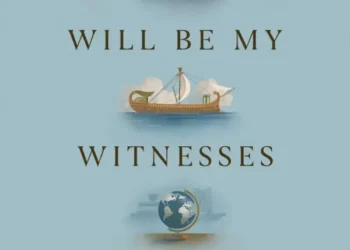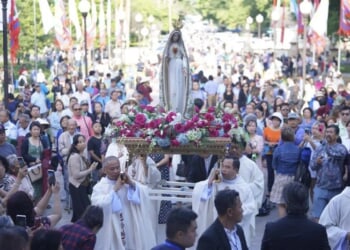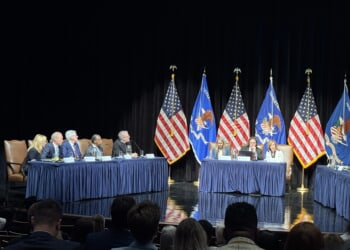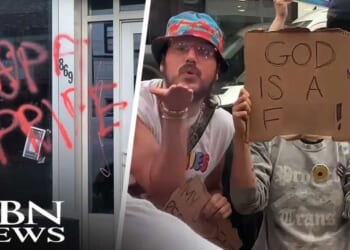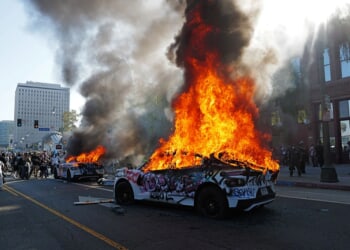In the latter half of the 1800s, the Native American Party or “Know Nothings” began popularizing the slogan “Native Americans, Beware of Foreign Influence” as a means of opposing increasing immigration from Europe, mostly Ireland and Germany. The phrase developed a particularly or uniquely anti-Catholic connotation, casting (mostly Irish) Catholics as unfit for American citizenship and alleging that their first allegiance would always be to Rome, not to the U.S. The Nativist catchphrase, immortalized in Martin Scorsese’s film Gangs of New York, where Bill “the Butcher” Cutting has it emblazoned across an American flag, has made a comeback in recent months.
Although most of America’s Founding Fathers were proud Protestants, Catholicism’s rich and wholesome influence on the nation’s founding is inescapable.
Although now more broadly used to caution against the influence of foreign governments and their lobbyists in American politics, the catastrophic surge in illegal immigration over the last four years in particular, and the increase in foreign-born politicians and judges, the old Nativist banner is still sometimes used to target American Catholics. When Catholic bishops ignore or diminish the Church’s age-old teachings on national sovereignty and harp on “refugees,” I often see my non-Catholic friends posting screenshots of Bill the Butcher staring at his flag. “Native American, Beware of Foreign Influence.”
But Catholicism is not foreign to America — not at all. In fact, a new Pew Research Center study has discovered that nearly half of all Americans have some connection to Catholicism, either personal or through their family. The study found that 20 percent of Americans are or identify as Catholic, nearly 10 percent of Americans consider themselves “cultural Catholics” (which Pew explains means that they identify as Catholic “ethnically, culturally, or because of their family background,” rather than religiously), 9 percent are former Catholics who have fallen away from the Church, and 9 percent say that they have some other connection to Catholicism, such as a Catholic parent or spouse. Additionally, 1.5 percent of American adults are converts to Catholicism.
Nor is this prevalence of Catholicism and Catholic connection simply some recent development. Christopher Columbus, who is credited with discovering the New World, was a devout Catholic, as was Amerigo Vespucci, after whom “America” is named. The Dominican Antonio de Montesinos celebrated the first Catholic Mass in what would become the U.S. (modern-day South Carolina) in 1526, about 80 years before Jamestown was established in Virginia.
Cecil Calvert, the second Baron Baltimore, founded Maryland as a safe haven for Catholics in the New World. Jesuit priests like Andrew White and Joseph Greaton helped to establish cities like Baltimore and Philadelphia and set up schools and churches. Charles Carroll defied anti-Catholic laws to help found the nation itself and was the only Catholic who signed the Declaration of Independence. Thomas Fitzsimmons was a rare Catholic in Quaker-dominated Pennsylvania, but he was one of George Washington’s most trusted advisors and signed the U.S. Constitution.
Although most of America’s Founding Fathers were proud Protestants, Catholicism’s rich and wholesome influence on the nation’s founding is inescapable. The work of Catholic philosophers and theologians such as Augustine, Thomas Aquinas, Francisco Suárez, and Robert Bellarmine was fundamental and integral to the concepts which shaped America’s founding, such as natural law, God-given rights, the protection of the common good, and others.
It is almost humorous that many of those who today deride American Catholics as channels of “foreign influence” nevertheless revere Patrick J. Buchanan, a Catholic, as an almost-prophetic hero. But make no mistake: Catholicism is not foreign to the United States of America. It has been coursing through the blood of this great nation since long before English Protestants built their first fort on these shores, and although the country’s Catholic heartbeat may today be fainter than it has been in ages past, it is still there.
READ MORE from S.A. McCarthy:


![Former Bravo Star Charged After Violent Assault Using a Rock-Filled Sock in Tennessee Walmart [WATCH]](https://www.right2024.com/wp-content/uploads/2025/07/Former-Bravo-Star-Charged-After-Violent-Assault-Using-a-Rock-Filled-350x250.jpg)



![Karoline Leavitt Levels CNN's Kaitlan Collins and Other Legacy Media Reporters [WATCH]](https://www.right2024.com/wp-content/uploads/2025/07/Karoline-Leavitt-Levels-CNNs-Kaitlan-Collins-and-Other-Legacy-Media-350x250.jpg)
![Man Arrested After Screaming at Senators During Big Beautiful Bill Debate [WATCH]](https://www.right2024.com/wp-content/uploads/2025/06/Man-Arrested-After-Screaming-at-Senators-During-Big-Beautiful-Bill-350x250.jpg)




